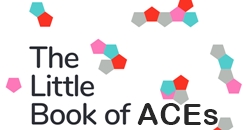 The Little Book of Adverse Childhood Experiences
The Little Book of Adverse Childhood Experiences
From an article by Sue Irwin
Sue Irwin is the co-author of a free book on Adverse Childhood Experiences (ACEs). She has over 23 years in education and learning. As a national lead on ACEs and founder of EmBRACE, Sue effectively leads other professionals to reflect and develop their practice, provide change management through an ACE lens and build trauma-informed cultures.
Surveys show that ACEs are very common, with between half and two thirds of respondents having experienced one or more ACE.
Current research and collected evidence clearly demonstrate the effects of cumulative and prolonged stress in a child’s body and brain, profoundly altering the development of their brains, immune systems and resistance to disease, so much so that a child with exposure to multiple ACEs may have a 20 year shorter life expectancy and is much more susceptible to risk taking or criminalised behaviour. Even worse, they are very likely to pass these traits on to the next generation.
The good news is that these outcomes can be improved and ACEs can be prevented. Early action and prevention can have a profoundly positive impact upon health, educational and criminal outcomes, improving the longterm outcomes for individuals and families, but also increasing the nation’s cultural, societal and financial capital.
Over half of the people you will meet today have lived with and been affected by ACEs. How would it alter the way you interact with them and your expectations of them, if you saw them through this lens? That is why this Little Book matters.
The toxic effects of ACEs will not be mitigated by a visit to a professional alone; appropriate support services will only be effective if they are complimented by the daily interactions that we all have with each other. This cannot be left to an anonymous professional to deal with, we all need to be aware and ready to play our part in healing the effects of so many silent and hidden cuts to people’s sense of self, health and prospects.
Download the pdf version of this book here.
Retweet about this article:
Geoff Knott, 24/04/2019